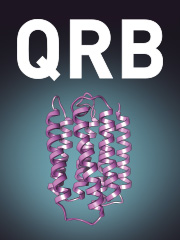Crossref Citations
This article has been cited by the following publications. This list is generated based on data provided by Crossref.
Hardie, Roger C.
and
Minke, Baruch
1992.
The trp gene is essential for a light-activated Ca2+ channel in Drosophila photoreceptors.
Neuron,
Vol. 8,
Issue. 4,
p.
643.
Nagy, Károly
1992.
Non-independent quantum bumps in Limulus ventral nerve photoreceptors - A new insight in the light transduction mechanism.
Neuroscience Letters,
Vol. 144,
Issue. 1-2,
p.
99.
Stieve, Hennig
and
Benner, Susanne
1992.
The light-induced rise in cytosolic calcium starts later than the receptor current of the Limulus ventral photoreceptor.
Vision Research,
Vol. 32,
Issue. 3,
p.
403.
Phillips, A.Marie
Bull, Ann
and
Kelly, Leonard E.
1992.
Identification of a Drosophila gene encoding a calmodulin-binding protein with homology to the trp phototransduction gene.
Neuron,
Vol. 8,
Issue. 4,
p.
631.
Hardie, R. C.
Peretz, A.
Suss-Toby, E.
Rom-Glas, A.
Bishop, S. A.
Selinger, Z.
and
Minke, B.
1993.
Protein kinase C is required for light adaptation in Drosophila photoreceptors.
Nature,
Vol. 363,
Issue. 6430,
p.
634.
Hardie, Roger C.
1993.
The invertebrate enigma.
Nature,
Vol. 366,
Issue. 6451,
p.
113.
Porter, Jeffery A.
Yu, Mujun
Doberstein, Stephen K.
Pollard, Thomas D.
and
Montell, Craig
1993.
Dependence of Calmodulin Localization in the Retina on the NINAC Unconventional Myosin.
Science,
Vol. 262,
Issue. 5136,
p.
1038.
Hanna, W. J. Brad
Johnson, Edwin C.
Chaves, Deborah
and
Renninger, George H.
1993.
Photoreceptor cells dissociated from the compound lateral eye of the horseshoe crab,Limulus polyphemus, II: Function.
Visual Neuroscience,
Vol. 10,
Issue. 4,
p.
609.
1993.
Ca2+limits the development of the light response inDrosophilaphotoreceptors.
Proceedings of the Royal Society of London. Series B: Biological Sciences,
Vol. 252,
Issue. 1335,
p.
223.
Hardie, R.C.
and
Minke, B.
1993.
Novel Ca2+ channels underlying transduction in Drosophila photoreceptors: implications for phosphoinositide-mediated Ca2+ mobilization.
Trends in Neurosciences,
Vol. 16,
Issue. 9,
p.
371.
Shin, Junghoon
Richard, Edwin A.
and
Lisman, John E.
1993.
Ca2+ is an obligatory intermediate in the excitation cascade of limulus photoreceptors.
Neuron,
Vol. 11,
Issue. 5,
p.
845.
Schraermeyer, U.
Stieve, H.
and
Rack, M.
1993.
Cyclic 3?, 5?-nucleotide phosphodiesterase: cytochemical localization in photoreceptor cells of the flyCalliphora erythrocephala.
Journal of Neurocytology,
Vol. 22,
Issue. 10,
p.
845.
Selinger, Zvi
Doza, Yair N.
and
Minke, Baruch
1993.
Mechanisms and genetics of photoreceptors desensitization in Drosophila flies.
Biochimica et Biophysica Acta (BBA) - Molecular Cell Research,
Vol. 1179,
Issue. 3,
p.
283.
H�pp, H.-P.
and
Alkon, D.L.
1993.
Different ionic conductances are modulated during the late receptor potential and the prolonged depolarizing afterpotential in Hermissenda type A photoreceptors.
Journal of Comparative Physiology A,
Vol. 172,
Issue. 1,
p.
47.
Nagy, K�roly
Contzen, Klaus
and
Stieve, Hennig
1993.
Two components of the receptor current are developed from distinct elementary signals in Limulus ventral nerve photoreceptor.
European Biophysics Journal,
Vol. 22,
Issue. 5,
p.
341.
Jarminowski, Hans
Schraermeyer, Ulrich
and
Stieve, Hennig
1993.
Calcium-accumulating organelles in the photoreceptor cells of the crayfish Orconectes limosus.
Comparative Biochemistry and Physiology Part B: Comparative Biochemistry,
Vol. 105,
Issue. 2,
p.
389.
Nagy, Károly
1993.
Cyclic nucleotides and inositol trisphosphate activate different components of the receptor current in Limulus ventral nerve photoreceptors.
Neuroscience Letters,
Vol. 152,
Issue. 1-2,
p.
1.
Hurley, James B.
1994.
Termination of photoreceptor responses.
Current Opinion in Neurobiology,
Vol. 4,
Issue. 4,
p.
481.
Yarfitz, S.
and
Hurley, J.B.
1994.
Transduction mechanisms of vertebrate and invertebrate photoreceptors..
Journal of Biological Chemistry,
Vol. 269,
Issue. 20,
p.
14329.
1995.
Evidence for a cGMP gated cation channel in photoreceptor cell membranes ofSepia officinalis.
FEBS Letters,
Vol. 364,
Issue. 2,
p.
189.


